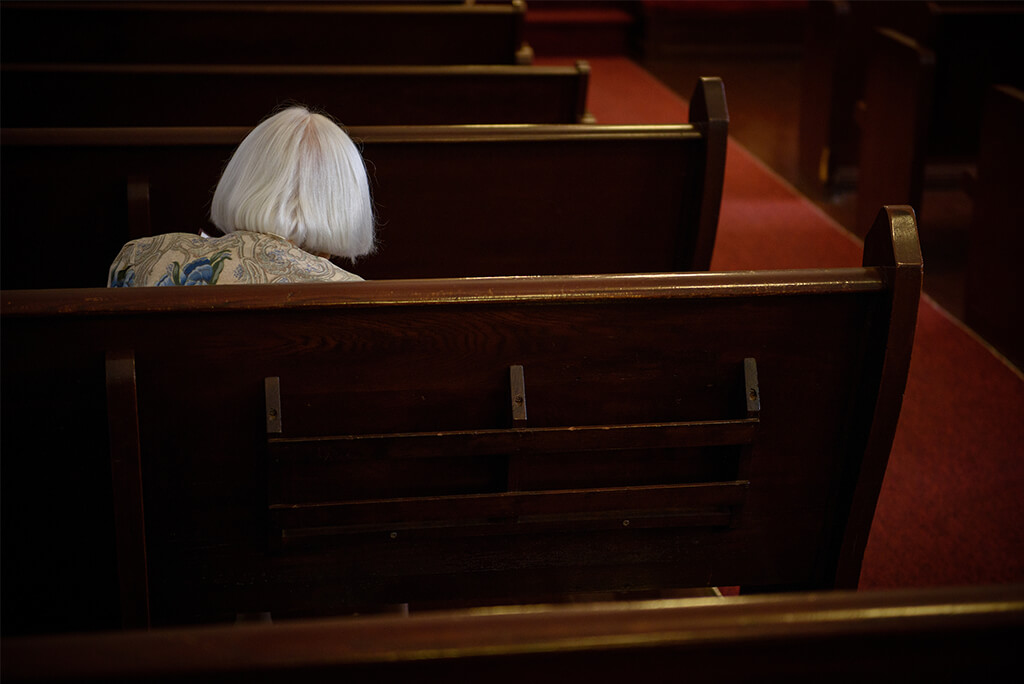By Joshua Hayes
If a couple came to me and said, “Pastor, we’d like to get married, and we’d like to do everything we can today to make sure our marriage ends in divorce tomorrow,” then I would tell them that the first thing they should do is move in together. Cohabitation is that destructive to marriage and family life.
However, the warning must not stop there. Because it is a form of public and intentional sin, cohabitation is particularly destructive to the conscience, and not just to the couple’s conscience but also to the conscience of the Christian community. Many couples view their choices as going no further than themselves. I would like to challenge this by considering some of the ways that cohabitation harms the broader Christian community.
A biblical concern
St. Paul had this broader concern in mind in his Epistle to the Galatians. He warned them about the dangers of open sins against conscience: “I warn you, as I warned you before, that those who do such things will not inherit the kingdom of God” (Gal. 5:21). He teaches the duty of seeking to restore those caught in sin: “Brothers, if anyone is caught in any transgression, you who are spiritual should restore him in a spirit of gentleness” (Gal. 6:1). But the verse does not stop there! Paul goes further still: “Keep watch on yourself, lest you too be tempted.”
Why would Christians need to keep watch on the themselves as they seek to address those caught in open sin? Surely the usual temptations to pride and self-righteousness must be overcome, but there is another: the temptation to view open sin against the commandments as not that big of a deal. To keep watch on myself I must recognize that not only do my sins harm my conscience, but the sins of others work to desensitize my conscience as well. “Do you not know that a little leaven leavens the whole lump?” (1 Cor. 5:6).
Returning to the sin of cohabitation, then, the church’s concern must not only be for the couple, but also for the conscience of the entire church and our witness before the world. Here are some of the ways that cohabitation harms the broader Christian community:
1. Cohabitation pressures Christians to be accepting of sin.
Because cohabitating couples are sinning openly, there comes a silent demand that everyone look the other way. Families and congregations feel pressured to be silent or even to be happy for them. Sometimes the crisis of conscience within the family is as painful as it is silent: “Do I speak up and risk ruining my relationship with my children?” Sadly, often the pastor or other spiritual leader (Gal. 6:1) is the only or first one to speak up.
Most of my readers will know what I mean. In a case of open sin, you were probably pressured to look the other way. Perhaps your children and relatives acted like the sin was normal and good. The hurt you felt needs to be acknowledged. It is not your fault that you had to speak the truth in love about their sin. It is not your fault that things are so messy. Even as we are called to forgive those who trespass against us, it is important to acknowledge that sin against us does indeed hurt!
Pastors feel this pressure too. The cohabitating couple often, even if silently, demands that the pastor publicly sanction what he is required from the Bible to ask others to forsake. They especially demand this if they demand a public church wedding but refuse to repent. And all of us feel the two-fold danger latent in the command in Galatians 6:1, namely failing to address the sin on the one hand, or, on the other hand, failing to do so “in a spirit of gentleness.” No easy task!
2. Cohabitation confuses the definition of marriage.
God created and defined marriage in Genesis 1–2. It consists in the union of one man and one woman for life. The marriage bed (sexual intimacy) is a blessing within marriage and sinful outside of marriage in every instance. There is never a case for marriage-only things outside of marriage, and a commitment to this truth in both word and deed is what the marriage vows are about. God wants to protect marriage from infidelity. Cohabitation implies that sometimes the marriage bed can be OK outside of marriage. This is a functional redefinition of the marriage vow.
3. Cohabitation suggests that all sin is the same.
Some people object that cohabitation is a sin just like any other sin, and that by calling on cohabiting couples to amend their lives the church is cherry-picking certain sins. The Scriptures will not allow us to follow this line of thinking. True, all sin is damning and separates us from God (Rom. 3:22–23). This does not mean, however, that all sin is the same in terms of the collateral damage it does to people’s lives and faith.
To take an easy example, both name-calling and murder are sin against the Fifth Commandment (Matt. 5:21–22). Jesus specifically says that fits of name-calling make us deserve fire in hell. Still, I would rather be called names than murdered. Or consider Judas and Pilate. Both were complicit in the death of innocent Jesus, and yet Christ Himself says that Judas had “the greater sin” (John 19:11). Just because every disease is potentially fatal does not mean that a doctor should treat every disease in the same way. The Small Catechism teaches us that we are not to view “openly unrepentant sinners” as being the same as “those who repent of their sins and want to do better” (SC, “Office of the Keys”).
Moreover, sexual sins are unique in that “every other sin a person commits is outside the body, but the sexually immoral person sins against his own body” (1 Cor. 6:18). Speaking again of sexual activity outside of marriage, St. Paul “solemnly warns” that “no one transgress and wrong his brother in this matter, because the Lord is an avenger in all these things” (1 Thess. 4:6). So among sins that are destructive to faith, sexual sins are especially grave, and among sexual sins cohabitation compounds the danger by arranging one’s life around the sin, making it frequent and publicly known. The conscience is simply no longer functioning as it ought but has been completely shaped by the ways of this world. So in this sense, no, not all sin is the same.
4. Cohabitation teaches a false view of repentance.
Finally, cohabitation tempts onlookers to adopt a false view of repentance as simply admitting sin in theory but not actually attempting to turn away from it in practice. True repentance, on the other hand, includes a commitment to changing sinful behavior with God’s help (Matt. 3:8) and a willingness to bear the consequences of the sin (Luke 15:21, 19:8).
Christian repentance includes a willingness to be admonished to live holy lives according to the Bible. It includes the baptismal and confirmation vow to renounces the devil “and all his ways.” Our Lutheran Confessions explain that true repentance bears fruit and amendment of life:
What these fruit are, we learn from the commandments—prayer, thanksgiving, the confession of the Gospel, the teaching of the Gospel, obedience to parents and magistrates, faithfulness to one’s calling, peaceable conduct instead of murder and hatred, the greatest possible generosity to the needy, restraint and chastisement of the flesh instead of adultery and fornication, truthfulness—not to buy off eternal punishment but to keep from surrendering to the devil or offending the Holy Spirit. These fruits are commanded by God, they should be done to his glory and because of his command, and they have their reward (Ap 12:174, Tappert 210, emphasis added).
Conclusion
The sin of cohabitation, like all manifest sin, afflicts not only the conscience of the ones engaging in it but also the conscience of the entire Christian community. The admonition “to keep watch on yourself lest you too be tempted” (Gal. 6:1) must not be ignored as Christians seek to restore those caught in sin. This is especially true as restoration and repentance do not always happen as quickly as we would like. We all have sins that we come to regret more slowly than we ought: “Remember not the sins of my youth or my transgressions!” (Psalm 25:7).
Pastors, parents, Christian friends and church members must seek to restore those caught in sin in a spirit a of gentleness, while at the same time being mindful that open sin, left unaddressed, desensitizes people’s consciences to sin — thus clouding their view of Jesus’ glory as the Savior from sin.
Too often we are afraid to speak the God’s Word clearly because we are afraid of the fallout. Our greatest fear is that people will leave the church, and this becomes an idol that ends up accomplishing the very opposite of our aim as people drift slowly away. Aware of no or few sins of their own, the church’s Savior becomes increasingly irrelevant.
To relax the commandments and teach others to do the same (Matt. 5:19) is Satanic work. Christ restored sinners with a spirit of gentleness (Gal. 6:1) while also speaking truth unswervingly. We must not be afraid to speak the Law of God in love to all, for it is our tutor unto Christ (Gal. 3:24).
Image: “Mother’s Sorrow” by Dagmar Furuhjelm, 1891.






I should have said, hi Josh! Sorry! It’s late.
We are from that early 1960’s group.
My wife grew up as the oldest of three girls who were orphaned as children. I met her as I then assa 20 year old single mom living alone. Happy, responsible, and never complaining. In two weeks I had seen enough and while exchanging small talk one evening in her home I asked her one question,”Can you think of a reason why we shouldn’t get married? “ She thought for a few seconds and said “ no I can’t think of any”. I then assured her that this didn’t mean I was inviting myself to start living together. She assured me that she fully understood that was not my intent.
I loved her so much that I would never have put her in a situation where she was compelled to question my intentions. And I guess she already knew that. A month later we were one.
My husband has offered three choices to cohabitating couples and it has always been well received. 1. Private confession/absolution followed by immediate marriage (often with big blessing/reception still held at normal date) 2. Private confession/absolution followed by lifestyle changes which enable couples to live apart/abstain until wedding with continued check INS and confession/absolution as needed 3. Public confession of sins before wedding audience at the beginning of the wedding service.
We have had couples choose all three options.
This is interesting. Cohabitation of Christian couples before marriage was once something many in my own circle of friends from high school avoided. Their values included the idea that they would simply not do it. They believed in marriage, and shared the convictions of their parents. This was the early 1960’s. Even young ladies in my school who became pregnant went home to have their child, and abortion was never part of their plan.. Those years preceded the sexual revolution, when the floodgates were opened and wrought forth a permissive society with the idea of right and wrong being blurred by new secular humanistic views and practices. These are topics the church pulpits throughout the land willfully ignored for too long. I remember a pastor of a non denominational Bible church I attended in the 1990’s who was asked by a divorced couple who attended briefly, if he would perform a marriage in the following year. They were evidently cohabitating and did want to be married, but the date was in the distant. They liked the church, an old white clapboard structure with a familiar bell tower, built over 100 years ago. The pastor politely told them he would not conduct a marriage ceremony for them on that basis, because they wanted to continue to live together until they were ready. The couple looked disappointed, and never returned to the church again. This elderly pastor valued the word of God in the topic, and said what had to be said. Perhaps, the society which wants its own way will bring the world into the church, and bearing some responsibility for this state are the pastors who remain silent, rather than offend.
Too often pastors are confronted with this in premarital counseling. It is so prevalent in our society that push back is the normal response when they are confronted with it. Pastors often think they the cure is marriage, but that is to condone the sin. Separation for a reasonable public time allows the couple to enter into matrimony with a fresh perspective and sets a good public example of confession, repentance and amended life.
RE: “seek to restore those caught in sin in a spirit of gentleness”
Details, please. How is this best done?
— How can we best pray?
— How can we best prepare for difficult conversation? What specific knowledge – Bible verses, other written guidance, statistics on cohabitation outcomes, etc. – would be good to be mindful of?
— What do we do with the awareness of our own failings?
— How can we best engage a believer?
— How can we best engage a non-believer?
— What kinds of rationalizations might we anticipate hearing, and how might we best respond to each?
— When it appears from an initial conversation that a loved one has little interest in reconsidering his or her lifestyle, what then?
— When it appears that a loved one is willing to reconsider his or her lifestyle, what then?
— What can we learn from actual accounts of pastors and other Christians attempting “to restore those caught in sin”?
— What can we learn from actual accounts of cohabiting couples who heeded Christian counsel and chose to live apart in preparation for marriage? How were they challenged? How were they blessed?
Hi Paul,
Well done! Thank you! However, even better if you also addressed the cohabitating couple, often seniors, where sexual intimacy, beyond a hug, hand holding, and kiss, isn’t happening. I had a late 80’s/early 90’s couple make that claim many years ago as we discussed their cohabitation.
How should we respond to those situations?
Thanks again and God’s blessings!
Pastor Peter Richert